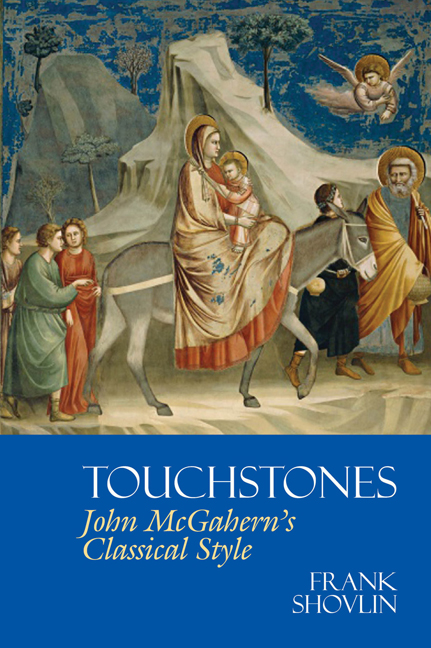Book contents
- Frontmatter
- Dedication
- Epigraph
- Contents
- Acknowledgements
- Touching Stones: Matthew Arnold and the Canon
- 1 We Other Clerks: James Joyce and the Classical Temper
- 2 A Walking Mirror: Stendhal, Horace, Nietzsche
- 3 One Lone Paperback: Tolstoy and Religious Sensibility
- 4 Magic: The Centrality of W. B. Yeats
- 5 Instinct: Douglas Stewart and Sex
- 6 The Fume of Muscatel: Yeats's Ghosts
- 7 Bohemian Rhapsody: Patrick Kavanagh and Generation X
- 8 Absurdity: Camus Comes to Clones
- 9 Aristocracy: Andrew Marvell, W. B. Yeats and the Curse of Cromwell
- 10 The Consolations of Nothingness: William Blake, W. B. Yeats and Prayer
- 11 Deliberate Happiness: W. B. Yeats and the Inner Life
- 12 Stranger in Paradise: Dante and Epic Style
- Conclusion: What Then?
- Bibliography
- Index
2 - A Walking Mirror: Stendhal, Horace, Nietzsche
from Touching Stones: Matthew Arnold and the Canon
- Frontmatter
- Dedication
- Epigraph
- Contents
- Acknowledgements
- Touching Stones: Matthew Arnold and the Canon
- 1 We Other Clerks: James Joyce and the Classical Temper
- 2 A Walking Mirror: Stendhal, Horace, Nietzsche
- 3 One Lone Paperback: Tolstoy and Religious Sensibility
- 4 Magic: The Centrality of W. B. Yeats
- 5 Instinct: Douglas Stewart and Sex
- 6 The Fume of Muscatel: Yeats's Ghosts
- 7 Bohemian Rhapsody: Patrick Kavanagh and Generation X
- 8 Absurdity: Camus Comes to Clones
- 9 Aristocracy: Andrew Marvell, W. B. Yeats and the Curse of Cromwell
- 10 The Consolations of Nothingness: William Blake, W. B. Yeats and Prayer
- 11 Deliberate Happiness: W. B. Yeats and the Inner Life
- 12 Stranger in Paradise: Dante and Epic Style
- Conclusion: What Then?
- Bibliography
- Index
Summary
Why, my good sir, a novel is a mirror journeying down the high road.
Stendhal, The Red and the Black‘With the growth of the intelligence’, writes McGahern, ‘we learn to differentiate the pure from the impure. The tolerance of admitting that our temperaments are themselves limited. Stendhal & Chateaubriand. Byron & Keats’. The quote is drawn from a handwritten, undated fragment of non-fiction held in the McGahern Archive. The document consists of a list of numbered observations about reading and writing – my opening quote comes from number 6. Number 7, in its amalgam of Chesterton, Auden and Proust, is even more revealing in its consideration of literary influence and the sustaining power of a great tradition:
It is with contact with other minds that we sharpen our own
Auden rephrasing Chesterton
No man can lay claim to a full life unless he has broken bread with the great dead […]
Distinction and nobility consist, in the order of thought also, in a kind of freemasonry of customs, and in an inheritance of traditions
That Stendhal (b. Henri Beyle 1783–1842) should make the list of writers from whom McGahern draws sustenance should not come as a surprise. One of the canonical figures of nineteenth-century French fiction of which McGahern was such an admirer, Stendhal makes glancing appearances throughout the Leitrim writer's oeuvre, and is directly if somewhat puzzlingly mentioned in The Pornographer:
Maloney was at breakfast when I went into the Commercial. He probably had a hangover. He was in a sour mood.
‘How did you find the local blooms?’ I asked.
‘This isn't Grenoble and I'm not Stendhal's uncle. Have some coffee? Tell me how you got your decorations.’
‘She had the child. I went to see her in London. She had a protector who beat me up.’
In this novel about sex, its representation and misrepresentation, the comment is probably a reference to an incident in Stendhal's childhood and to his uncle, Romain Gagnon, an incorrigible libertine, who covered the terrace of his house in Grenoble with an array of flowers. Stendhal fondly recalls looking at the stars with his uncle, surrounded by these flowers.
- Type
- Chapter
- Information
- Touchstones: John McGahern’s Classical Style , pp. 34 - 46Publisher: Liverpool University PressPrint publication year: 2016



